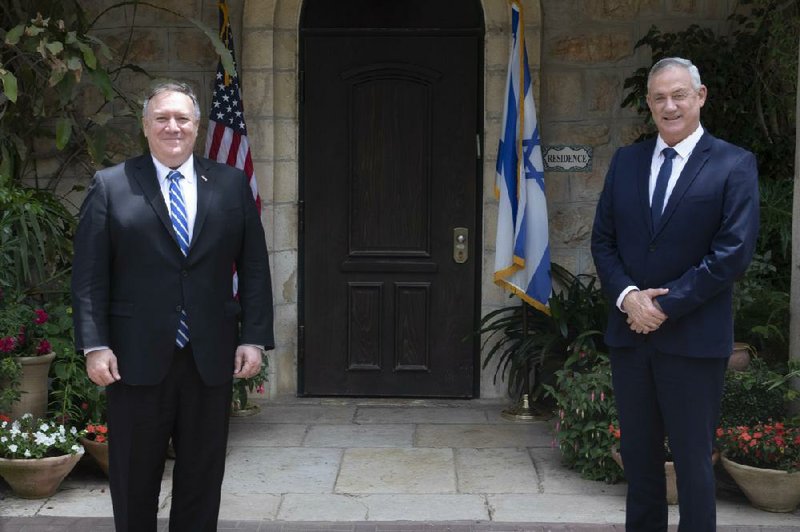JERUSALEM -- Secretary of State Mike Pompeo met Wednesday with Israeli Prime Minister Benjamin Netanyahu to discuss the country's plans to annex parts of the West Bank, as Israeli troops shot and killed a Palestinian teen in a clash with stone-throwers in the occupied territory.
Pompeo's brief visit to Israel took place as Israeli troops searched for whoever killed a soldier a day earlier by dropping a rock from a rooftop during an army raid of a West Bank village.
Pompeo landed in Tel Aviv early Wednesday, wearing a red, white and blue mask, and headed directly to Jerusalem, receiving an exemption from Israel's mandatory two-week quarantine for arrivals during the coronavirus outbreak. He is the first foreign official to visit Israel since January, before the country largely shut its borders to curb the pandemic.
Standing alongside Pompeo, Netanyahu said the eight-hour visit is a "testament to the strength of our alliance." The two said their talks would focus on shared concerns about Iran, the battle against the coronavirus and Israel's incoming government.
[CORONAVIRUS: Click here for our complete coverage » arkansasonline.com/coronavirus]
Netanyahu and his new coalition partner, Blue and White party leader Benny Gantz, postponed the swearing-in of their government until today to accommodate Pompeo's visit.
Pompeo also met with Gantz, the former army chief who fought Netanyahu to a draw in three elections over the past year and a half before agreeing to join him in an emergency unity government.
And Pompeo met with Gabi Ashkenazi, another former army chief and an ally of Gantz's who is to become foreign minister in the new government.
A State Department official, speaking on condition of anonymity because he was not authorized to discuss the meetings publicly, said the point of the brief visit was not only to discuss annexation, but also the threat from Iran, as well as Israel's ties with China.
[Video not showing up above? Click here to watch » https://www.youtube.com/watch?v=5P688XV8rhQ]
Neither Netanyahu nor Pompeo mentioned Wednesday's violence in the southern West Bank. The Palestinian Health Ministry said a 15-year-old boy was killed in confrontations with Israeli forces near the city of Hebron. It said four others were wounded by live fire. The Israeli military said troops had responded with live fire to a "violent riot" and that it was "aware" of the reports of a casualty.
On Tuesday, an Israeli soldier was killed in the northern West Bank after being struck in the head with a rock thrown off a rooftop. The military said it had arrested 10 suspects.
Pompeo expressed his condolence on the soldier's death and said "Israel has the right to defend itself and America will consistently support you in that effort."
One of the key items on the agenda in Pompeo's talks Wednesday was expected to be Israel's stated intention to annex parts of the West Bank.
Pompeo said "there remains work yet to do and we need to make progress on that." Ahead of the visit, Pompeo told the Israeli daily Israel Hayom on Tuesday that he was coming to hear Netanyahu and Gantz's views on the matter.
Netanyahu and Gantz struck a power-sharing deal last month after three parliamentary elections over the past year resulted in stalemate. Under the deal, Netanyahu would remain prime minister for the next 18 months. After a year and a half, Gantz will serve as prime minister for 18 months.
The agreement also stipulates that Netanyahu can advance plans to annex West Bank land, including dozens of Jewish settlements, starting July 1. The deal says such a move must be coordinated with the U.S. while considering regional stability and peace agreements.
Under President Donald Trump's Mideast plan unveiled in January, the Palestinians would have limited statehood contingent on a list of requirements while Israel would annex some 30% of the West Bank. The Palestinians have rejected the plan.
Netanyahu said the new government offered "an opportunity to promote peace and security based on the understandings I reached with President Trump."
The presumptive Democratic nominee, Joe Biden, has said he opposes unilateral annexation plans by Israel.
In November, Pompeo stated that the administration no longer believed that Israel's West Bank settlements were inconsistent with international law.
But Netanyahu's plans to annex occupied West Bank territory have drawn criticism. The Arab League has said annexation would be a "war crime." And the European Union, as well as individual member states, have warned of tough consequences if Israel moves forward.
The Trump administration has said it will support the annexation of West Bank territory -- as long as Israel agrees to enter peace talks with the Palestinians.
A Section on 05/14/2020

